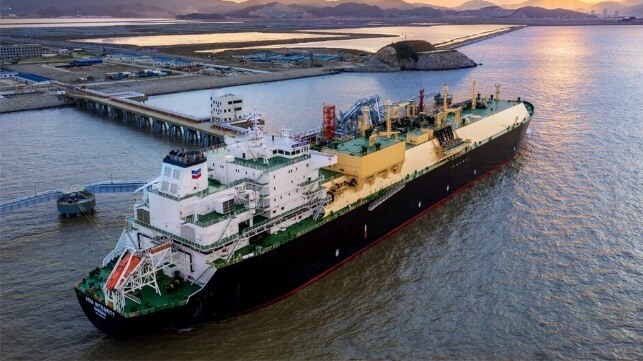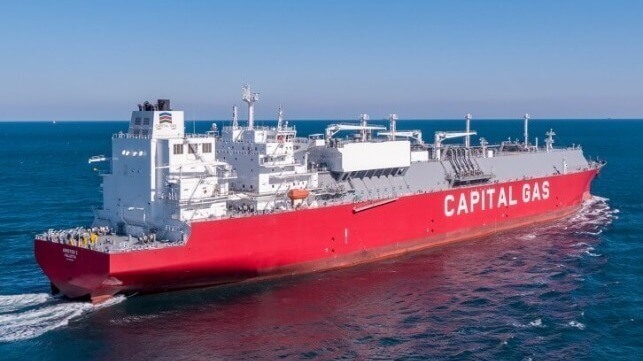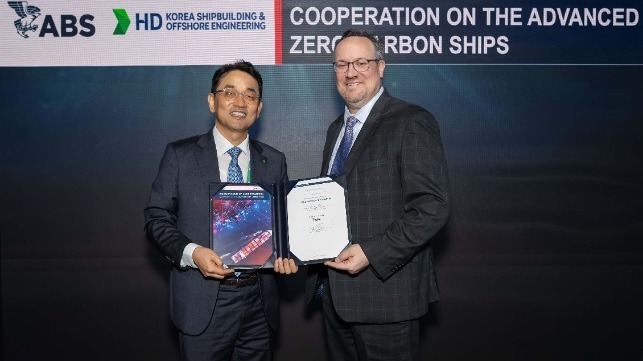Wärtsilä and Chevron Start Unique Engine Conversion to Reduce Methane Slip

Wärtsilä and Chevron Shipping Company are starting a first-of-its-kind program to convert engines on six of the company’s LNG carriers to reduce methane slip. The companies undertook a two-year collaboration to develop a unique approach to one of the key issues in the use of LNG as a marine fuel. Chevron placed an order to proceed with the conversion of the first two vessels.
"Chevron Shipping aims to reduce methane emissions intensity of our LNG fleet in support of a lower carbon future," says Barbara Pickering, President of Chevron Shipping. "We are pleased to collaborate with Wärtsilä in this industry first.
Environmentalists have focused on the release of unburnt methane which is known as methane slip. They argue that methane is a more harmful greenhouse gas as it traps more heat in the environment. The maritime engine and LNG groups respond that the newer generation of engines has reduced or eliminated methane slip while multiple initiatives are also looking at the potential of a scrubber-like installation to capture the methane from a vessel’s emissions.
Wärtsilä explains that the conversion program is designed to convert its popular dual-fuel engine to spark gas (SG) operation. The company explains that using spark ignition versus diesel pilot fuel to initiate combustion enables a more optimized combustion process. It reduces the methane slip and improves efficiency.
"This innovative project represents a notable step forward on the road to advancing lower-carbon fleets," said Roger Holm, President of Wärtsilä Marine & Executive Vice President at Wärtsilä Corporation. “Wärtsilä has an extensive track record in reducing methane slip from LNG-fuelled engines, not only as newbuild solutions but also through retrofitting existing installations.”
This new technology complements Wärtsilä's extensive portfolio of solutions aimed at reducing methane emissions from vessels. With nearly three decades of experience in LNG technology, Wärtsilä says it focuses on providing both the dual fuel flexibility provided by the DF engine, as well as with the single-fuel SG engine.
No details were announced on the timing of the conversion or where it would take place.
Chinese Shipyard Opts for Wärtsilä Cargo Handling & Fuel Gas Supply Systems

[By: Wärtsilä]
Wärtsilä Gas Solutions, part of technology group Wärtsilä, will supply the cargo handling and fuel gas supply systems for four new medium-sized gas carrier (MGC) vessels. The ships are being built at the Nantong CIMC Sinopacific Offshore & Engineering (SOE) shipyard in Shanghai for Greek operator Capital Gas Ship Management. The order was booked by Wärtsilä in Q3 2024.
c is the market leader in supplying cargo handling and fuel gas supply systems for MGCs, and this order once again strengthens this position. The 40,000 cbm capacity vessels will transport and operate with liquefied petroleum gas (LPG). The Wärtsilä systems are designed to ensure safe and efficient operation with this category of cargo and fuel.
While Wärtsilä has worked closely with SOE for several years, these will be the first Wärtsilä cargo handling and fuel gas supply systems for vessels operated by Capital Gas Ship Management.
“We have a long-term relationship with SOE, having delivered a various range of gas related products and systems. Being awarded this repeat order is very important to us, since it indicates a high level of customer satisfaction,” commented Barry Yang, Sales Manager, Wärtsilä Gas Solutions, China.
The Wärtsilä equipment is scheduled for delivery to the yard commencing in March 2026.
The products and services herein described in this press release are not endorsed by The Maritime Executive.
ABS Signs MOU with HD KSOE to Advance Zero-Carbon Ships

[By: ABS]
Enhancing their collaboration on cutting-edge marine and technology projects, ABS and HD Korea Shipbuilding & Offshore Engineering (HD KSOE) signed a memorandum of understanding (MOU) to advance the development and certification of innovative systems for next-generation, zero-carbon ships.
Representatives from both companies met at Gastech 2024 for the signing ceremony. Entitled “Cooperation on the Advanced Zero-Carbon Ships,” the MOU focuses on integrating advanced technologies in three main areas:
- A novel LNG cargo handling system that utilizes full re-liquefaction system to suppress boil-off gas (BOG) for zero-carbon LNG carriers
- A comprehensive ammonia fuel supply system including pressure control for large commercial vessels
- An efficient integrated system that enhances re-liquefaction with cold ammonia fuel supply, thereby improving system efficiency and reducing power consumption
“To help safely deliver the rapid technological advances our industry needs, collaboration will be essential. ABS is proud to expand our relationship with HD KSOE, and we look forward to working together on innovative concepts to optimize and enhance next-generation vessels,” said Patrick Ryan, ABS Senior Vice President and Chief Technology Officer.
“HD KSOE and ABS are committed to advanced key technological developments for the next-generation vessel market through collaboration. We look forward to presenting a long-term vision for gas carriers and zero-carbon fueled ships, focusing on achieving net-zero emissions,” said Sung Young-jae, HD KSOE Vice President and Research Director of Decarbonization Research Lab.
ABS provides comprehensive decarbonization and sustainability solutions for the offshore and maritime industries. The ABS approach, combined with extensive technical knowledge and customized solutions, helps owners and operators achieve their decarbonization and sustainability goals.
The products and services herein described in this press release are not endorsed by The Maritime Executive.
No comments:
Post a Comment